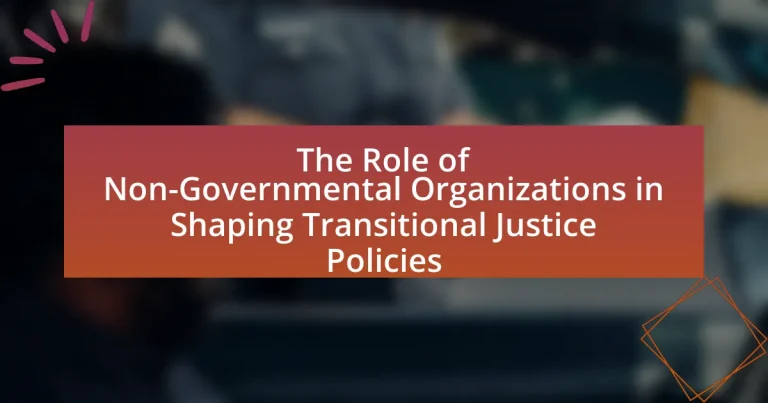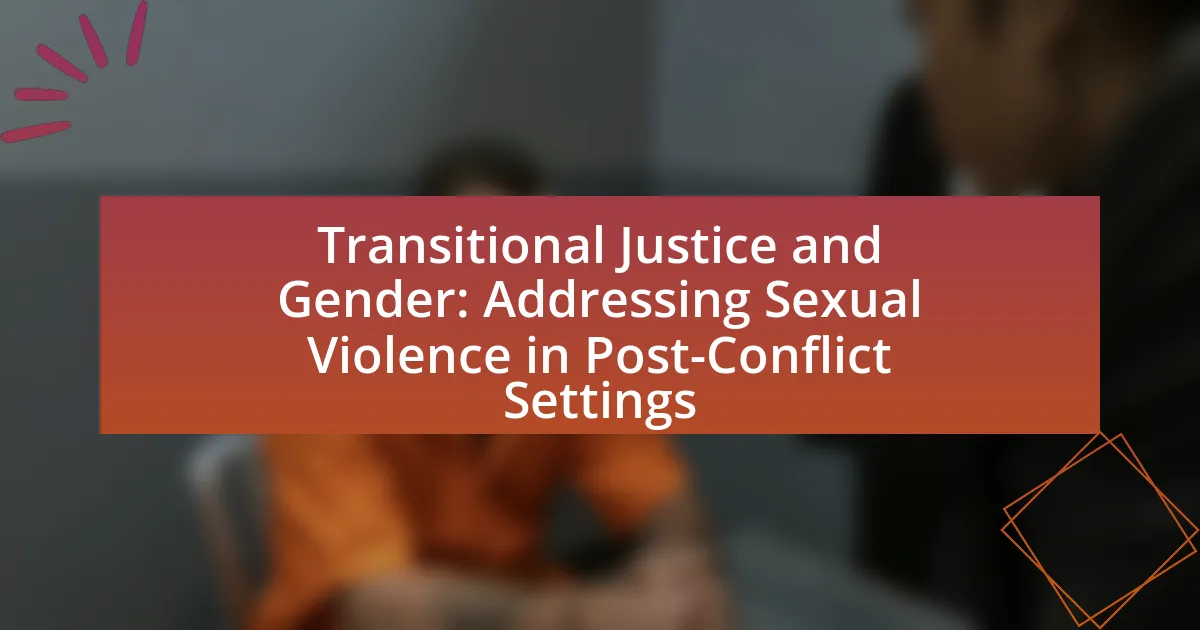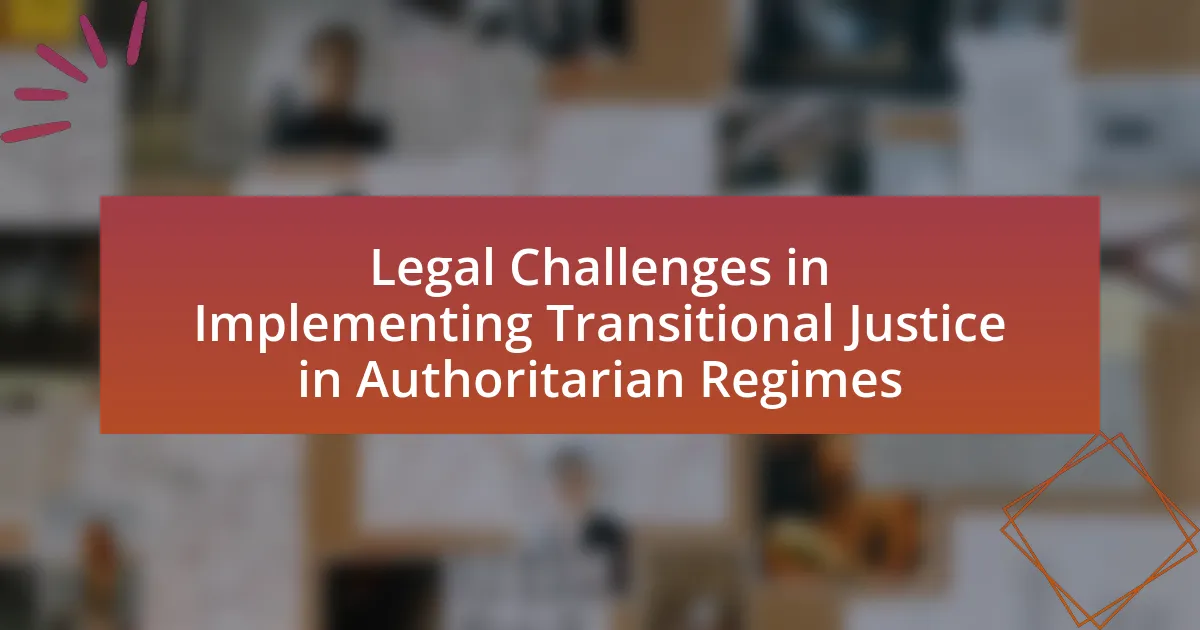Non-Governmental Organizations (NGOs) play a vital role in shaping transitional justice policies by advocating for accountability, promoting victims’ rights, and influencing legal frameworks. They engage in research, provide legal assistance, and mobilize communities to ensure that transitional justice mechanisms are responsive to the needs of affected populations. The article examines how NGOs influence transitional justice frameworks, their key functions, regional variations in their roles, and the challenges they face, including government resistance and funding limitations. Additionally, it highlights the strategies NGOs employ to overcome these challenges and the impact of their involvement on transitional justice outcomes, emphasizing the importance of community engagement and advocacy in promoting effective justice systems.
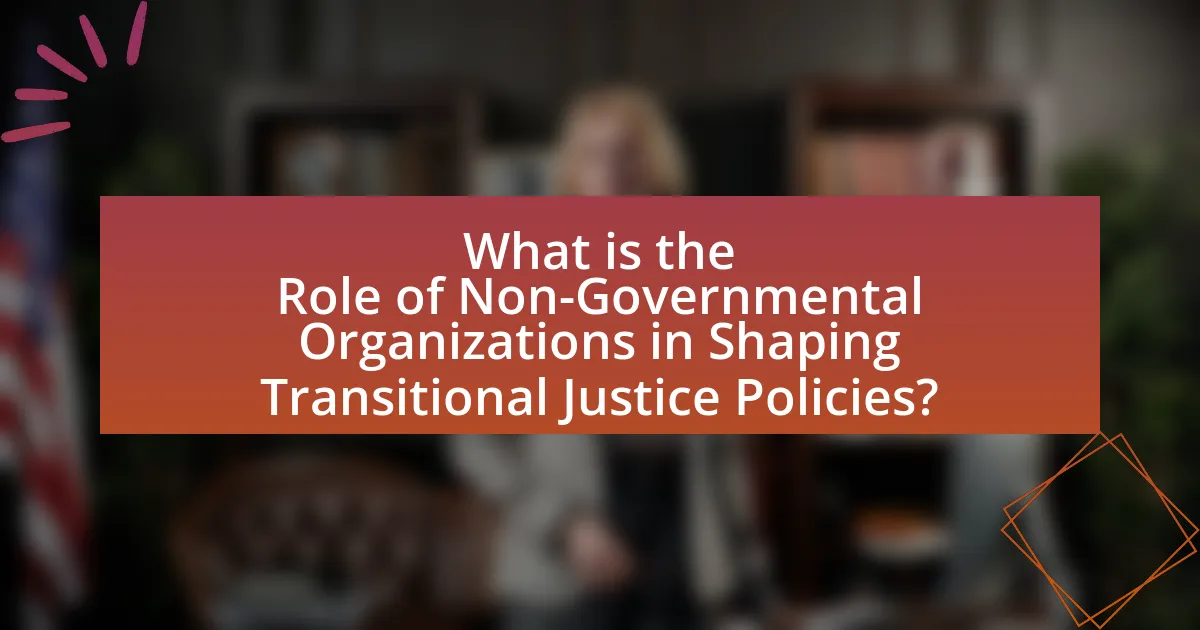
What is the Role of Non-Governmental Organizations in Shaping Transitional Justice Policies?
Non-Governmental Organizations (NGOs) play a crucial role in shaping transitional justice policies by advocating for accountability, promoting victims’ rights, and influencing legal frameworks. NGOs often conduct research, provide legal assistance, and mobilize communities to ensure that transitional justice mechanisms address the needs of affected populations. For instance, organizations like Human Rights Watch and Amnesty International have documented human rights abuses and lobbied for policy changes in various countries, contributing to the establishment of truth commissions and reparations programs. Their involvement ensures that transitional justice processes are inclusive and responsive to the demands of society, thereby enhancing the legitimacy and effectiveness of these policies.
How do Non-Governmental Organizations influence transitional justice frameworks?
Non-Governmental Organizations (NGOs) influence transitional justice frameworks by advocating for victims’ rights, promoting accountability, and shaping public discourse. NGOs often conduct research and gather evidence on human rights violations, which informs policy recommendations and legal reforms. For instance, organizations like Human Rights Watch and Amnesty International have documented abuses in various countries, leading to international pressure for justice mechanisms. Additionally, NGOs engage in capacity-building initiatives, training local actors in transitional justice processes, thereby enhancing the effectiveness of these frameworks. Their involvement ensures that marginalized voices are heard, contributing to more inclusive and representative justice systems.
What are the key functions of Non-Governmental Organizations in this context?
Non-Governmental Organizations (NGOs) play crucial roles in shaping transitional justice policies by advocating for human rights, providing legal assistance, and facilitating community engagement. These organizations often serve as watchdogs, monitoring government actions and ensuring accountability for past abuses, which is essential for building trust in transitional justice processes. Additionally, NGOs contribute to the development of policy frameworks by conducting research and providing evidence-based recommendations, thereby influencing legislative reforms. Their involvement in grassroots mobilization helps raise awareness and empowers affected communities, ensuring that their voices are heard in the transitional justice discourse.
How do these functions vary across different regions?
Non-governmental organizations (NGOs) play varying roles in shaping transitional justice policies across different regions due to distinct political, social, and cultural contexts. In Latin America, for example, NGOs often focus on truth-seeking and reparations, influenced by historical experiences with authoritarian regimes, as seen in countries like Argentina and Chile where organizations like the Mothers of the Plaza de Mayo have been pivotal. In contrast, in post-conflict African nations such as Rwanda, NGOs may prioritize reconciliation and community-based justice mechanisms, reflecting the need for social cohesion after genocide, as demonstrated by the work of organizations like the National Unity and Reconciliation Commission. Furthermore, in Eastern Europe, NGOs often engage in advocacy for legal reforms and accountability, shaped by the legacy of communism and the push for European integration, as evidenced by the efforts of organizations in countries like Serbia and Bosnia. These regional variations highlight how local histories and societal needs influence the functions of NGOs in transitional justice processes.
Why are Non-Governmental Organizations essential in transitional justice processes?
Non-Governmental Organizations (NGOs) are essential in transitional justice processes because they provide critical advocacy, expertise, and support for victims of human rights violations. NGOs often serve as intermediaries between affected communities and governmental bodies, ensuring that the voices of marginalized groups are heard in the justice process. For instance, organizations like Human Rights Watch and Amnesty International have documented abuses and pushed for accountability, influencing policy changes and legal reforms in various countries. Their involvement helps to promote transparency, build trust in the justice system, and facilitate the implementation of reparations and truth commissions, which are vital for societal healing and reconciliation.
What unique perspectives do Non-Governmental Organizations bring to transitional justice?
Non-Governmental Organizations (NGOs) bring critical perspectives to transitional justice by advocating for victims’ rights, promoting accountability, and ensuring community involvement in the justice process. NGOs often serve as intermediaries between affected communities and governmental bodies, amplifying the voices of marginalized groups and highlighting their specific needs. For instance, organizations like Human Rights Watch and Amnesty International have documented human rights abuses and provided evidence that informs transitional justice mechanisms, thereby influencing policy decisions. Their grassroots connections enable them to gather firsthand accounts of injustices, which are essential for creating comprehensive and inclusive transitional justice frameworks. This unique positioning allows NGOs to challenge state narratives and push for reforms that prioritize restorative justice over punitive measures, ultimately contributing to more equitable and sustainable outcomes in post-conflict societies.
How do they contribute to the legitimacy of transitional justice initiatives?
Non-Governmental Organizations (NGOs) contribute to the legitimacy of transitional justice initiatives by advocating for human rights, promoting accountability, and facilitating community engagement. Their involvement ensures that the voices of victims are heard, which enhances the perceived fairness and inclusivity of the justice process. For instance, NGOs often conduct research and provide evidence-based recommendations that inform policy decisions, thereby increasing transparency and trust in the system. Additionally, by monitoring the implementation of transitional justice measures, NGOs hold governments accountable, which reinforces public confidence in these initiatives.
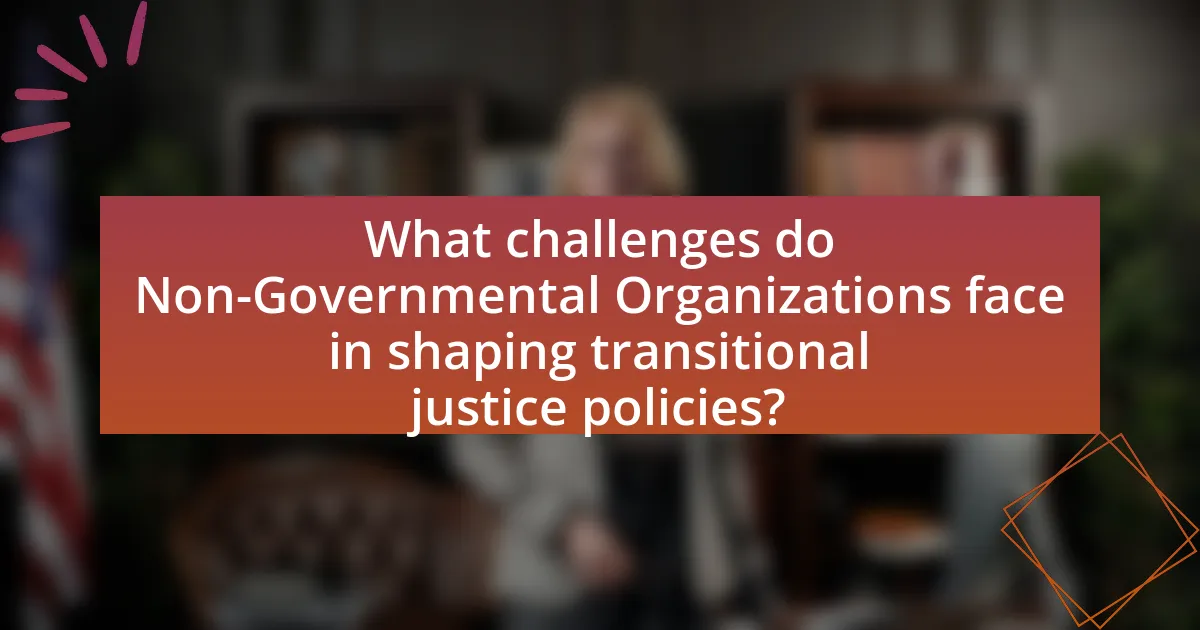
What challenges do Non-Governmental Organizations face in shaping transitional justice policies?
Non-Governmental Organizations (NGOs) face significant challenges in shaping transitional justice policies, primarily due to limited access to decision-makers and political power dynamics. These organizations often struggle to influence governmental agendas, especially in contexts where political will is lacking or where there is resistance from state actors. For instance, in countries emerging from conflict, NGOs may encounter hostility from governments that perceive their advocacy as a threat to sovereignty or stability. Additionally, NGOs frequently operate with constrained financial resources, which limits their capacity to conduct extensive research, mobilize communities, and sustain long-term advocacy efforts. The complexity of transitional justice itself, which involves legal, social, and cultural dimensions, further complicates the ability of NGOs to propose coherent and widely accepted policies. These challenges are evidenced by case studies in various post-conflict societies, where NGOs have reported difficulties in engaging with local populations and securing meaningful participation in transitional justice processes.
How do political environments affect the work of Non-Governmental Organizations?
Political environments significantly influence the work of Non-Governmental Organizations (NGOs) by determining their operational freedom, funding availability, and overall effectiveness. In authoritarian regimes, NGOs often face restrictions on their activities, limiting their ability to advocate for transitional justice policies. For instance, in countries like Egypt, the government has imposed stringent laws that hinder NGO operations, resulting in reduced advocacy for human rights and justice reforms. Conversely, in democratic settings, NGOs typically enjoy greater autonomy and support, enabling them to engage more effectively in policy dialogue and implementation. Research by the International Center for Not-for-Profit Law indicates that supportive political environments correlate with increased NGO capacity to influence policy changes, demonstrating the critical role of political context in shaping NGO effectiveness in transitional justice initiatives.
What are the implications of government resistance on their effectiveness?
Government resistance significantly undermines the effectiveness of transitional justice policies. When governments oppose or obstruct these policies, it leads to a lack of accountability for human rights violations, which can perpetuate cycles of violence and injustice. For instance, in countries like Syria and Myanmar, government resistance has resulted in stalled investigations and a failure to provide reparations to victims, thereby eroding public trust in both governmental and non-governmental efforts. This resistance not only hampers the implementation of justice mechanisms but also diminishes the overall legitimacy of transitional justice initiatives, as seen in the case of South Africa, where initial government support was crucial for the success of the Truth and Reconciliation Commission.
How do funding limitations impact their operations?
Funding limitations significantly hinder the operational capacity of non-governmental organizations (NGOs) involved in shaping transitional justice policies. These financial constraints restrict NGOs’ ability to conduct comprehensive research, implement programs, and engage with affected communities effectively. For instance, a study by the International Center for Not-for-Profit Law indicates that NGOs with limited funding often struggle to maintain staff, leading to reduced expertise and diminished outreach efforts. Consequently, the lack of adequate resources can result in incomplete data collection and insufficient advocacy, ultimately undermining the effectiveness of transitional justice initiatives.
What strategies do Non-Governmental Organizations employ to overcome these challenges?
Non-Governmental Organizations (NGOs) employ various strategies to overcome challenges in shaping transitional justice policies. These strategies include advocacy for policy reform, building coalitions with other civil society organizations, and engaging in public awareness campaigns. For instance, NGOs often lobby governments and international bodies to adopt specific transitional justice measures, leveraging evidence-based research to support their positions. Additionally, by forming alliances with other NGOs, they can amplify their voices and resources, enhancing their influence on policy discussions. Public awareness campaigns help to educate communities about transitional justice issues, fostering grassroots support that can pressure policymakers to act. These approaches have been effective in numerous contexts, such as in post-conflict societies where NGOs have successfully influenced the establishment of truth commissions and reparations programs.
How do they build coalitions with other stakeholders?
Non-Governmental Organizations (NGOs) build coalitions with other stakeholders by engaging in collaborative dialogue, establishing shared goals, and leveraging their networks for mutual benefit. They often initiate partnerships through outreach efforts, identifying common interests with other organizations, government entities, and community groups. For example, NGOs may organize workshops or forums to facilitate discussions on transitional justice, allowing stakeholders to voice their concerns and align their objectives. This collaborative approach is supported by evidence from various case studies, such as the work of NGOs in post-conflict societies, where coalition-building has led to successful advocacy for policy changes and enhanced community participation in justice processes.
What role does advocacy play in their approach?
Advocacy plays a crucial role in the approach of non-governmental organizations (NGOs) in shaping transitional justice policies by amplifying the voices of marginalized communities and influencing policy decisions. Through targeted campaigns, NGOs raise awareness about human rights violations and promote accountability, thereby driving legislative changes. For instance, organizations like Human Rights Watch and Amnesty International have successfully lobbied for the establishment of international tribunals and truth commissions, demonstrating the effectiveness of advocacy in creating frameworks for justice and reconciliation. This impact is evidenced by the adoption of the Rome Statute of the International Criminal Court, which was significantly influenced by advocacy efforts highlighting the need for accountability in cases of war crimes and crimes against humanity.
What are the outcomes of Non-Governmental Organizations’ involvement in transitional justice policies?
Non-Governmental Organizations (NGOs) significantly influence transitional justice policies by advocating for victims’ rights, promoting accountability, and facilitating community engagement. Their involvement often leads to increased public awareness of human rights violations, which can pressure governments to implement reforms. For instance, NGOs like Human Rights Watch and Amnesty International have documented abuses and lobbied for legal frameworks that support truth commissions and reparations, resulting in more comprehensive justice mechanisms in countries like South Africa and Colombia. Additionally, NGOs often provide critical support in the design and implementation of transitional justice processes, ensuring that marginalized voices are included, which enhances the legitimacy and effectiveness of these policies.
How do Non-Governmental Organizations measure their impact on transitional justice?
Non-Governmental Organizations (NGOs) measure their impact on transitional justice through a combination of qualitative and quantitative methods, including surveys, interviews, case studies, and monitoring and evaluation frameworks. These methodologies allow NGOs to assess changes in public perception, the effectiveness of legal reforms, and the overall progress towards accountability and reconciliation in post-conflict societies. For instance, NGOs often utilize indicators such as the number of legal cases pursued, the level of community engagement in transitional processes, and the extent of victim participation in justice mechanisms to quantify their impact. Additionally, reports and assessments published by organizations like Human Rights Watch and Amnesty International provide concrete evidence of the effectiveness of transitional justice initiatives, demonstrating how NGOs contribute to shaping policies and practices in this field.
What indicators are used to assess their effectiveness?
Indicators used to assess the effectiveness of non-governmental organizations (NGOs) in shaping transitional justice policies include the level of stakeholder engagement, the impact of advocacy efforts, and the degree of policy change achieved. Stakeholder engagement can be measured through participation rates in consultations and forums organized by NGOs. The impact of advocacy efforts is often evaluated by analyzing media coverage and public awareness campaigns initiated by these organizations. Additionally, the degree of policy change can be assessed by tracking the adoption of recommendations made by NGOs in official governmental policies or legal frameworks. These indicators provide a comprehensive view of how effectively NGOs influence transitional justice processes.
How do success stories from Non-Governmental Organizations influence future policies?
Success stories from Non-Governmental Organizations (NGOs) significantly influence future policies by providing evidence-based models that demonstrate effective solutions to social issues. These success stories serve as case studies that policymakers can reference to justify the adoption of similar strategies in their own contexts. For instance, the success of NGOs in promoting community-based reconciliation initiatives in post-conflict regions has led to the incorporation of such approaches in national transitional justice frameworks, as seen in countries like South Africa and Rwanda. By showcasing tangible outcomes, such as reduced violence or improved community relations, these organizations create a compelling narrative that encourages governments to align their policies with proven practices.
What best practices can Non-Governmental Organizations adopt to enhance their role in transitional justice?
Non-Governmental Organizations can enhance their role in transitional justice by adopting best practices such as fostering community engagement, ensuring inclusivity, and advocating for accountability. Community engagement allows NGOs to understand local needs and perspectives, which is crucial for effective transitional justice processes. Inclusivity ensures that marginalized voices are heard, promoting a more comprehensive approach to justice. Advocacy for accountability involves pushing for legal and institutional reforms that hold perpetrators accountable, thereby reinforcing the rule of law. These practices are supported by evidence from successful transitional justice initiatives, such as the role of NGOs in South Africa’s Truth and Reconciliation Commission, which highlighted the importance of community involvement and accountability in achieving justice and reconciliation.
How can they improve collaboration with local communities?
Non-Governmental Organizations (NGOs) can improve collaboration with local communities by actively engaging in participatory decision-making processes. This approach ensures that community voices are heard and integrated into transitional justice policies, fostering trust and ownership among local populations. Evidence from the International Center for Transitional Justice indicates that when NGOs involve communities in policy formulation, it leads to more effective and culturally relevant outcomes, as seen in the case of South Africa’s Truth and Reconciliation Commission, where community input significantly shaped the process and results.
What innovative approaches can they implement to engage stakeholders effectively?
Non-Governmental Organizations (NGOs) can implement innovative approaches such as participatory workshops and digital platforms to engage stakeholders effectively. Participatory workshops allow stakeholders to contribute their perspectives and experiences, fostering a sense of ownership and collaboration in transitional justice processes. Digital platforms, including social media and online forums, facilitate real-time communication and feedback, enabling broader participation and engagement from diverse groups. Research by the International Center for Transitional Justice highlights that these methods enhance transparency and inclusivity, which are critical for building trust and ensuring that the voices of marginalized communities are heard in shaping justice policies.
